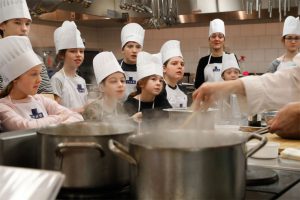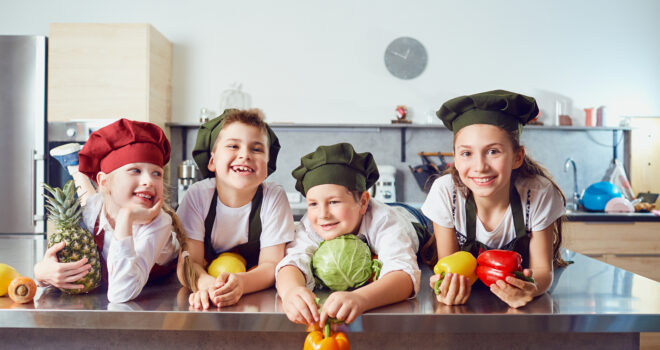Since 2004, the goal of the Louis Bonduelle Foundation is to sustainably improve eating behaviours. At the core of such a challenge: nutrition education. To make it effective, the Foundation studied the real impact of prevention actions.
Increasing the consumption of vegetables is a must! To continue to sustainably and effectively improve eating behaviours, the Louis Bonduelle Foundation carried out different research projects with children to measure the effectiveness of on-the-ground actions and to understand the determining factors: discover the EPICALIM project.
Nutrition education: theory & practice
Analysis of 17 scientific experiments demonstrated that actions that combine several procedures (cooking activities and nutritional learning) produce a significant increase in children’s consumption of vegetables. To complete and back the existing literature, the Foundation measured children’s consumption of vegetables after different activities (cooking, gardening, exhibitions) taking into account their degree of food neophobia.

Enfants participant à un atelier culinaire à Montreal pour le
programme de recherche Epicalim
The project demonstrated the following advantages as a result of hands-on workshops, and in particular cooking activities:
- Consumption of leguminous vegetables increases after a hands-on workshop (gardening or cooking).
- The impact of a cooking workshop varies according to a child’s degree of food neophobia.
- A cooking workshop has greater impact on the consumption of leguminous vegetables in neophobic children than a gardening workshop
- Hands-on workshops produce an increase in the consumption of new products presented in several forms.
Acquisition of cross-functional skills through cooking
Beyond the positive impact on consumption, cooking activities help children develop new skills such as self-efficiency, self-esteem and curiosity. These cross-functional qualities develop up to a month following the activity, before decreasing significantly. Furthermore, they could explain the increase in the consumption of leguminous vegetables after cooking workshops.
Different research studies regarding the nutritional factors that determine consumption choices show that pleasure is the main motivation lever in children. Having fun while learning about and cooking vegetables in one of the key factors in the consumption of vegetables.



 Red kidney beans
Red kidney beans  Spinach
Spinach  Vegetable garden: growing soy bean
Vegetable garden: growing soy bean 









